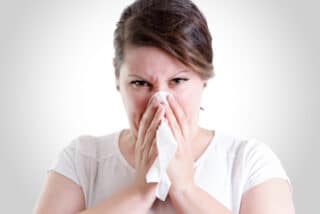
More Allergy, Asthma & Infectious Disease Articles
Coping With Nasal Allergies

Do you have a nasal allergy? Nasal allergies cause the lining of your nose to become swollen and inflamed. Do you have:
- A runny nose with a thin, watery discharge?
- Nasal itching and congestion?
- Red, itching eyes?
- Sneezing?
- Drainage from your nose down the back of your throat?
If so, then you may be a nasal allergy sufferer. Your pharmacist can help you decide whether to see a doctor or whether to treat your symptoms yourself.
The next question to ask yourself is if your allergies are perennial, seasonal, or both?
Many different triggers can cause nasal allergies.
Perennial Triggers
- Dust mites
- Animal hair or dander
- Indoor mold
Because these triggers are present all the time, these allergies are said to be perennial.
Seasonal Triggers
- Pollen from trees
- Ragweed
- Grass
- Weeds
Because these triggers are around only during certain times of the year, these allergies are said to be seasonal.
A few people suffer from both perennial and seasonal allergies. They may have symptoms all year round, but they tend to be worse during certain seasons.
How Do I Avoid the Triggers That Cause My Nasal Allergies?
Avoiding triggers entirely probably is not possible. But you can do a number of things to minimize them. Talk to your doctor or pharmacist about specific products – such as filters and bedding covers – that can help you clear your environment of triggers.
How Can I Control My Symptoms?
Seasonal and perennial nasal allergies can be treated effectively using medications. Many are available without a prescription. Talk to your doctor or pharmacist to determine which one of these is best for you.
Antihistamines:
- Oral medications (taken by mouth)
- Nasal sprays
How it might help: Reduces itching, sneezing, eye irritation, and runny nose.
What to keep in mind:
- Not effective for nasal congestion.
- May cause drowsiness.
- Antihistamine nasal sprays may leave a bad taste in the mouth.
Decongestants:
- Oral medications (taken by mouth)
- Nasal sprays
How it might help: Reduces nasal congestion.
What to keep in mind:
- Can cause difficulty sleeping, loss of appetite, or excessive nervousness.
- Decongestant nasal sprays may temporarily reduce nasal congestion but can cause even more severe congestion if used for more than 3-5 days or more often than recommended.
Cromolyn sodium nasal spray:
How it might help: Effective in some people for controlling symptoms of nasal allergies.
What to keep in mind:
- Works only if used before nasal symptoms appear.
- Won’t work during an active allergy attack
Corticosteroid nasal spray:
How it might help:
- Highly effective treatment of nasal allergies.
- Used as the primary preventive treatment for patients with moderate to severe allergies.
What to keep in mind:
- May cause nasal dryness.
- As an oral medication, can be taken over the short term (3-7 days) for treatment of severe symptoms.
Other Articles You May Find of Interest...
- How To Support Your Immune System Throughout Spring Allergy Season
- Embracing the Summer Allergy Season
- Coping With Nasal Allergies
- The Dangers Of Gluten
- Indoor Air Quality During Quarantine
- Facts About Food Allergies
- Spring Allergies Tips To Ease Your Allergy Symptoms

















